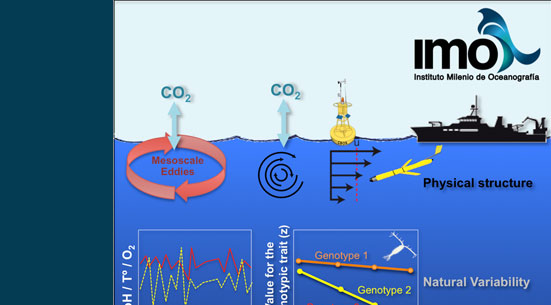IMO is an institute dedicated to the investigation of oceanographic problems that require integrative and collaborative approaches ranging from processes of molecular to planetary scale, using the South East Pacific Ocean as an observation model. IMO studies physical, biogeochemical and ecological processes of the open sea as well as the exploration of the deep and abyssal ocean, which includes pelagic ecosystems, associated with seamounts, oceanic islands and the Atacama Trench. His research topics include:
- A Variable and Changing Ocean.
- The Deep Ocean
Our research group is mostly involved in the Research Line 1. This research theme is organized around three major questions:
How well do biogeochemical flows, community composition, and even population structure of key species correlate with physical oceanographic drivers? The output goal is to determine the scales at which biogeochemical function, plankton community composition, and population structure of key zooplankton and phytoplankton are correlated with the physical structure of the ocean.
How does biogeochemical function differ among norm-oxic, Oxygen Minimum Zone (OMZ), and Anoxic Marine Zone (AMZ) marine systems? Nearly a decade ago it was proposed that acidification expands OMZs by affecting their biogeochemical function, but this remains unproven. Meanwhile, it becomes increasingly clear that AMZs may function differently than OMZs. The output goal is to compare biogeochemical function in norm-oxic, OMZ, and AMZ waters, through participation in at least one major national cruise, in international cruise opportunities, and smaller focused field campaigns; and,
What is the resilience of key communities and organisms to a changing ocean, and can that be predicted by their origin? We will focus on exploring how environmental hardening upon low pH/high pCO2 conditions can provide intra-generational acclimatization upon OA scenarios, and how it may vary depending on generation time of marine organisms (e.g. phyto vs. zooplankton). Global scale “Common-garden” experiments with cosmopolitan species (inter-hemisphere studies) will allow to understand how natural variability across the ocean can determine the resilience of marine communities upon ocean changing conditions not only at regional, but also for the world ocean scale. The output goals are to determine the roles of community robustness, population level variability, and phenotypic plasticity at individual levels in predicting responses to predicted future ocean multi-stressor conditions.
More information http://en.imo-chile.cl/

